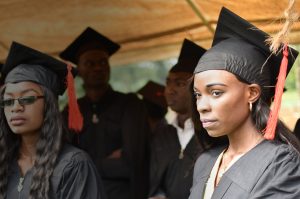 When the Academic Dean for Teaching, Innocent Bora, read the academic results at the 2016 UCBC graduation, the crowd erupted in cheers when Clarisse Ngoyi’s name was read. Ngoyi graduated with distinction and at the top gradu-ate in her class.
When the Academic Dean for Teaching, Innocent Bora, read the academic results at the 2016 UCBC graduation, the crowd erupted in cheers when Clarisse Ngoyi’s name was read. Ngoyi graduated with distinction and at the top gradu-ate in her class.
A native of Beni and the daughter of parents working in the medical profession, Ngoyi grew up knowing the importance of education. Both her parents serve in the medical profession at a local hospital. Ngoyi’s interests, however, were in communications, and she was pleased to hear a university in her hometown offered such a program. More over, she was drawn to UCBC’s mission and values.
“I chose to attend UCBC because I wanted to study at university different from others in DRC. UCBC is exalting some good spiritual values and virtues that we don’t find in other universities in DRC,” Ngoyi said.
One of the challenges in Congo is the presence of hierarchal and sometimes corrupt administration of schools and universities. For a passionate and committed student like Ngoyi, attending a university that provided a comfortable space was crucial.
Reflecting on her time at UCBC and comparing it with what she has heard about other universities in Congo, Ngoyi explained, “I enjoyed the community life. We shared our lives without any fear. We were considered equal to staff members and there was no corruption. As I studied my courses, I received the grade I deserved. In other universities, it is hard to get the grade you deserve.”
For Ngoyi, her studies are on the one hand, her passion. She loves to study, to learn, to engage challenging concepts and think how they apply to her chosen field of communications. But, she is also aware of the gender disparity, and the important role education plays in creating future opportunities for women. As a student and a member of Women’s Voices, Ngoyi worked to promote women in education and continues to encourage female students to participate fearlessly in a culture that remains male-dominated.
“I try to tell women not to be discouraged or underestimate themselves thinking that they are inferior compared to men in the faculty of their choice, in the choice of university. We are all the same and equal and they should feel themselves able to also go to school because it’s very important for a woman to study,” Ngoyi said.
As a graduate, Ngoyi hopes to find a job opportunity in Beni, incorporating the spirit of service and community garnered during her time at UCBC. But, her true desire is to pursue graduate studies and look for opportunities to excel in her field – opportunities to improve her country.
“I chose communications, thinking how can I benefit my country and people in need. I want to deepen my knowledge in my domain so I can work effectively and help my country. I believe through our new generation we can change the situation in Congo.”
